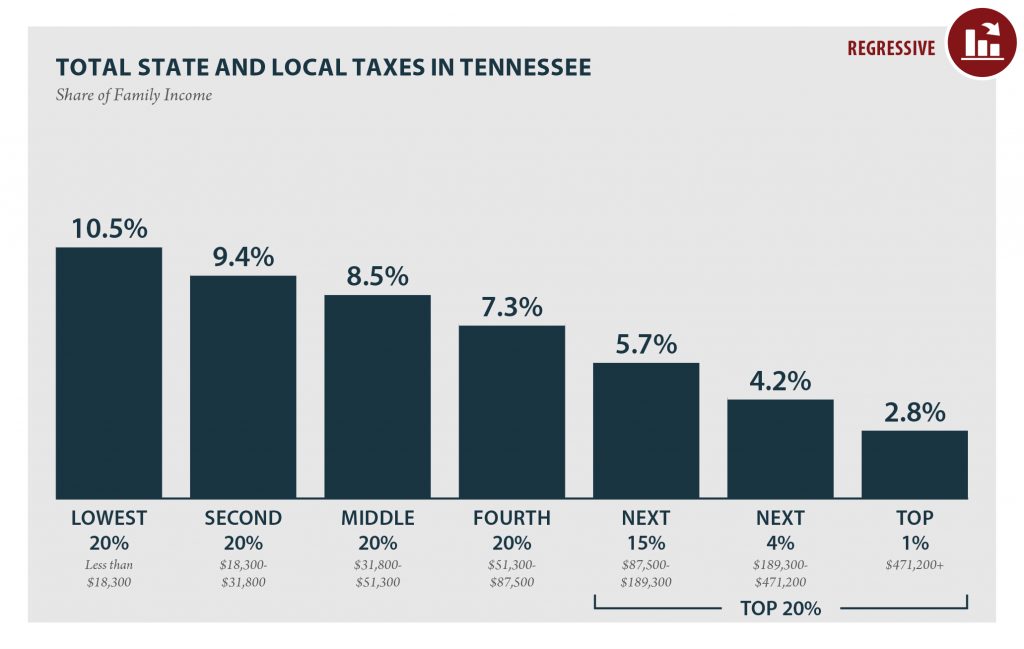We wrote earlier this week about Trends We’re Watching in 2020, and this week’s Rundown includes news on several of those trends. Maine lawmakers are considering a refundable credit for caregivers and New Mexico leaders have advanced an important credit expansion. Efforts to tax high-income households made news in Maryland, Oregon, and Washington. Grocery taxes are receiving scrutiny in Alabama, Idaho, and Tennessee. Tax cuts or shifts are being discussed in Arizona, Nebraska, and West Virginia. And Arizona, Maryland, and Nevada continue to seek funding solutions for K-12 education as Alaska and Virginia do the same for transportation infrastructure.
— MEG WIEHE, ITEP Deputy Director, @megwiehe
Major State Tax Proposals and Developments
- MARYLAND lawmakers are considering a number of bills that could generate $2 billion by 2030 to improve the state’s education system. The proposals include requiring combined reporting for multistate corporations, applying a 1 percent surtax on capital gains income, restructuring state income tax brackets, cutting tax credit programs, and other reforms. — KAMOLIKA DAS
- The WEST VIRGINIA Senate plans to unveil major changes to the tax structure including a property tax cut for businesses, which will be paid for by a sales tax increase and tobacco tax increase. Details are still being finalized. — KAMOLIKA DAS
- NEW MEXICO leaders in a key House committee advanced landmark legislation to end the current practice of excluding working parents under age 25 and working immigrants from the state’s Working Families Tax Credit. — MARCO GUZMAN
- The full NEBRASKA legislature will consider the Revenue Committee’s proposal to lower property taxes by increasing state aid to schools and restricting school spending, though there are serious concerns that the spending restrictions are too severe and will reduce the quality of K-12 education over time, while also reducing aid to higher-need districts. Meanwhile debate continues over a bill to replace the state’s business tax subsidy program, but this proposal too is raising concerns for its lack of transparency and large cost to the state budget. — DYLAN GRUNDMAN
Governors’ Budget Proposals and State of the State Speeches
- In his sixth State of the State address, MARYLAND Gov. Larry Hogan reiterated his support for a sweeping and costly tax break that would benefit Maryland retirees. He proposes eliminating all income taxes for retirees who earn less than $50,000 per year and dramatically cutting tax bills for those who earn less than $100,000.
- In his State of the State address, WYOMING Gov. Mark Gordon announced his support for a lodging tax to ensure that the state is taking full advantage of its tourism industry, and called on lawmakers to craft legislation that includes a temporary, price-based reduction in severance taxes to help support the struggling natural gas industry.
- Other states whose governors gave their annual addresses recently, though without major tax proposals, include ALABAMA, CONNECTICUT, NEW HAMPSHIRE, OKLAHOMA, and TENNESSEE. No more addresses are scheduled in February.
State Roundup
- The ALABAMA House of Representatives approved a bill that prohibits cities from enacting new occupational taxes through their city councils without legislative permission. The measure comes as Montgomery considered the possibility of creating a 1 percent occupational tax.
- ALABAMA State Sen. Andrew Jones introduced a constitutional amendment that would eliminate the state sales tax on groceries. The bill compensates for the loss of sales tax revenue by capping the federal income tax deduction (FIT) for state income tax filers.
- ALASKA lawmakers propose gas tax and vehicle registration increases and a state lottery to help offset the state’s $1 billion-plus deficit. Meanwhile, Gov. Mike Dunleavy is emphasizing that a cut to the state’s Permanent Fund dividend, major spending cuts, or any tax increases go to a public vote.
- ARIZONA lawmakers have decided to try to use higher-than-expected revenues from new tax collections on remote sales as an opportunity to push for tax cuts. The proposals include a property tax cut for commercial and residential properties that would cost $100 million a year and a plan to cut income taxes and eliminate a vehicle license fee that would cost $161 million in the first year.
- Also, an ARIZONA lawmaker announced her plan to raise dedicated funding for education by proposing that a new, 1-cent sales tax be included on the 2020 ballot. A competing measure proposed by state education leaders earlier in the year, however, would raise just under $1 billion by creating a 3.5 percent tax surcharge for single filers making more than $250,000 or married joint filers making more than $500,000.
- Sports betting remains a topic of discussion (and disagreement) in CONNECTICUT this session. Lawmakers are also weighing a proposal to tax ammunition sales at a 35 percent rate to fund gun violence prevention.
- The FLORIDA House Ways & Means Committee proposed a wide range of state tax reductions including reduced state aviation fuel taxes for commercial air carriers, cuts to the communications service tax, the elimination of a stadium-funding program, and a back-to-school tax holiday in August. Several of these tax proposals are moving through the Senate as well.
- IDAHO lawmakers refused to hold a hearing on two proposed bills that would have repealed both the 6 percent sales tax on food purchased in grocery stores and the grocery credit that helps taxpayers offset the tax, while another, similar bill was withdrawn. Some lawmakers cited the complicated list of taxable food as an issue.
- A KENTUCKY House panel approved a new excise tax on vaping and a tax increase on other tobacco products this week. The bill would raise nearly $50 million over the next two years. It now advances to the full House.
- A bill to provide tax credits for affordable housing developers in MAINE is expected to be signed by the Governor.
- Also in MAINE, lawmakers recently introduced a bill that would provide a refundable $2,000 income tax credit for low- and moderate-income family caregivers. AARP estimates that there are 181,000 family caregivers in Maine, providing 152 million hours of unpaid family care each year. Meanwhile, policymakers seek to limit big-box retailers from fighting their local tax bills and depleting local revenue. The “dark store theory” maintains that local property tax assessments should be based on the value of vacant building, even while the business is up and running.
- MASSACHUSETTS Gov. Charlie Baker’s budget proposal includes a provision that would require businesses owing $100,000 or more in sales taxes over the previous year to pay their sales tax on digital transactions daily.
- Lawyers working for the powerful gambling industry in NEVADA are suing to try to stop an effort by state teachers to raise gaming taxes to better fund education needs.
- NEW HAMPSHIRE lawmakers introduced a bill that would enable municipalities to set the commercial and industrial property tax rate higher than the residential rate.
- Lawmakers on NEW MEXICO’s Senate Judiciary Committee voted 6-4 to table a bill that would have legalized and imposed a 9 percent tax on the recreational use of cannabis in the state.
- Plans are being considered to revamp NEW YORK City’s property tax code. Proponents of the new plan point to the inequities created under the current system.
- An OHIO resolution that would require a two-thirds vote of the Ohio General Assembly to approve an income tax increase is working its way through the legislature. However, concerns have been raised about the resolution’s impact on the Buckeye State’s bond rating, constraints it would place on funding key programs and limits it would impose during recessions. Senate Joint Resolution 3 would need to be approved by a supermajority of lawmakers and a majority of voters during the 2020 election to amend the state Constitution.
- The Portland, OREGON, area could use a local income tax increase on high-income households to fund $250 million worth of homelessness services.
- PENNSYLVANIA lawmakers revived a bill to eliminate the state’s school property taxes. Meanwhile, tax credits came under review in a report by an independent office tasked with determining their effectiveness.
- Lawmakers in TENNESSEE deserve credit for at least trying to find ways to reduce taxes on the state’s lowest-income residents—e.g. by exempting drinking water from the sales tax or creating sales tax holidays for feminine hygiene products and groceries—but it will take more fundamental reform to meaningfully improve on the state’s upside-down tax structure.
- VIRGINIA lawmakers approved raising the gas tax to fund road improvements and rail infrastructure. However, the Senate bill would increase the gas tax for two years, as opposed to the House’s version, which would raise it over three years.
- Similar to the proposal above in Oregon, WASHINGTON state lawmakers are considering allowing local jurisdictions to fund homelessness services and affordable housing measures through a tax on the payroll of business with highly paid employees.
- A package of bills that would provide $29.5 million in tax breaks to WISCONSIN farmers is quickly making its way to the governor’s desk after only being introduced just several days ago. The bills would provide farmers with a $7,500 tax rebate while another would allow sole proprietors to deduct the cost of health insurance.
- WYOMING lawmakers have advanced a bill that would allow counties to make the “fifth penny tax” permanent. The state currently authorizes counties to add an additional 1 percent tax to the 4 percent state sales tax following approval from two-thirds of a county’s municipalities, but the proposed bill would lower the threshold to 50 percent.
- Also, a bill that would impose a 5 percent tax on lodging services – 2 percent of which would go to local governments – is making its way through the WYOMING Legislature after a 6-1 House committee vote.
What We’re Reading
- The Tax Policy Center has a powerful new tool for dissecting how the federal income tax code intersects with race and ethnicity, potentially exacerbating or alleviating inequities. As most state income taxes are based in some part on the federal tax, states can learn a lot through this tool too.
- The Center on Budget and Policy Priorities provides an update on state efforts to improve their taxation of wealth and the fruits of wealth, such as estate taxes, mansion taxes, and taxation of capital gains.
- Governing reports on how the nation’s inequality problem is playing out not just economically but also geographically, as a small number of “superstar cities” account for a disproportionate share of economic growth.
If you like what you are seeing in the Rundown (or even if you don’t) please send any feedback or tips for future posts to Meg Wiehe at [email protected]. Click here to sign up to receive the Rundown via email.





